|
 |

SAT NEWS - SUSTAINABILITY EDITION

Dear Travel Partner,
sustainability has been gaining importance in the travel industry for years and especially after the push the discussion around climate change received in the last months, it has become a topic that every company should want to look into.
We at SAT recognize that sustainability is a serious commitment that impacts all areas of our company. You don't become sustainable overnight - it is a time consuming process that demands constant evolution, willingness to follow through and, in many areas, considerable financial investments. Every day, we work hard to extend our sustainable practices and although we are not perfect, we are proud of how far we have come!
In this newsletter, we want to share some of our actions with you and show you what we are doing to make our and your tours more sustainable.
Would you like to share your views, practices or feedback with us? Click here to get the conversation started!
Enjoy reading and all the best,
your SAT Team
Follow us on Facebook, Instagram and Youtube for more news, products and impressions!

*** Temporary office hours (Monday-Friday) ***
| SAT Argentina: |
9:00 - 13:00 |
SAT Ecuador: |
9:30 - 17:30 |
| SAT Brazil: |
9:00 - 13:00 |
SAT Peru: |
8:00 - 14:00 |
| SAT Chile: |
9:00 - 13:30 |
SAT Uruguay: |
9:30 - 13:30 |
| SAT Colombia: |
9:30 - 17:30 |
|
|
|
 |
|
 |
|
SUSTAINABILITY - ALL OR NOTHING?
|
 |
|
Many people seem to think that traveling sustainably requires an all or nothing approach. If you can't plan your tour sustainably, just stay at home. But that's easier said than done! There are millions of people all over the world who rely on international tourism to make a living, not just in the industry itself but in many related fields. We all saw the devastation that COVID-related travel restrictions brought and now know more than ever how important tourism is to keep people going. In addition to that, it is also an important source of funding
for national parks as well as social and conservation projects, all of which suffered with the suspension of tourism. And don't forget about how traveling has a way of opening our minds to the lives and experiences of others and bringing us together (literally)!
On the other hand, we also saw the positive impacts on nature and wildlife while people were staying at home.
For us, a big and fundamental part of the solution is to make sure that everybody involved comes together to make our industry better - for the environment and the people involved.
Keep reading to learn about some of the measures we have taken so far to do our part. We are excited for the next steps to come and to keep going in 2022!
|
 |
|
 |
|
PUTTING OUR OWN HOUSE IN ORDER
|
 |
The best starting point for a project is always close to home - or in our case, the office. This is the space that we can assess and work on in the quickest and most direct way. For those who have not visited South America yet, we have to preface this topic by explaining that many of our countries are still working on introducing practices that seem normal in other countries, such as waste separation or recycling. So we have our work cut out for us!
Let's take our
office in Buenos Aires as an example. The most obvious thing is to be mindful of paper waste. While it's not currently possible for us to go completely paperless, we
reduce paper waste by storing documents in our internal cloud instead of printing, making our quality questionnaires available via QR-code instead of handing them out and reusing any printed material as much as possible before recycling and replacing it with digital or other more sustainable options. In addition to that, we changed to
recycled paper when prints cannot be avoided. Another important investment was a
water purification system. As you might know, tap water in South America is generally not recommended for drinking so most households and offices use water dispensers with exchangeable plastic containers as well as individual plastic bottles. The new water purification system helps to avoid the previous amounts of plastic trash by filtering tap water to use instead! We also added signs to remind ourselves to
save water when washing our hands or dishes etc. Finally, we introduced a
system for waste separation as well as recycling batteries and bottle caps. Plastic trash is washed out and then recycled.
We would love to hear about the practices you apply in your home or place of work, and if you like to recommend something that we can adopt for ourselves, please let us know! |
|
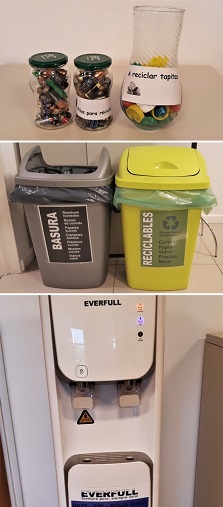 |
 |
|
 |
 |
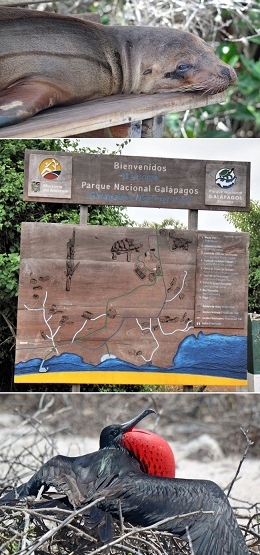 |
|
There are numerous destinations in South America, most notably organizations such as national parks or private protected areas, that apply sustainable standards to touristic activities in order to conserve their unique ecosystems and support local communities. Tourists are an important source of funding for a successful operation, financing essential elements such as staff, maintenance works and of course the projects that protect and preserve both natural and cultural heritage.
One of the leading examples in this area is the
Galapagos National Park. It was created in 1959 and was the very first entry on UNESCO's renowned preservation list of World Heritage Sites in 1978. Since then, the park has come a long way: the terrestrial part of the park covers roughly 7,970km2, plus 133,000km2 or marine reserve. At the beginning of November, it was announced, that 60,000km2 will be added to the marine reserve to protect an even bigger area from extractive activities such as fishing. In 2018,
the archipelago phased out single-use plastics, including bottles, bags, straws and containers. Any
tour operator is required to follow strict guidelines, for example conserving water and energy, recycling and treating waste material, sourcing locally-produced goods and hiring local employees at fair wages and with opportunities of additional training. Furthermore, there are
education initiatives to create a public awareness for environmental issues early on and a strong focus on advancing sustainable developments in society, for example in agriculture. As a tour operator, we do our part in supporting these advancements by purchasing operating licenses and authorizations for tourist services. Would you like to learn about additional destinations you can actively support with your visit? Just
contact us! |
 |
|
 |
 |
|
Getting to know the people that live in the places we visit is a big part of our journeys. When choosing between different experiences, keep an eye out for communities that are self-organized and free to decide which parts of their lives and culture to share with visitors. This also assures that the generated income stays where it is needed and can be used directly to guarantee livelihoods, further education for both children and adults and invest in future prospects.
One of these communities is
La Boquilla, located in the outskirts of Cartagena at the Caribbean coast of Colombia. The community’s main income source is fishing but they have managed to create a second business in tourism. For example, visitors can participate in different workshops with locals that support great causes: the organization
DAMARTES helps local women to financially support their families by teaching how to craft jewelry and small souvenirs from coconut and
BATAMBORA, created by a group of young entrepreneurs, teaches drum and music classes to shine a light on and preserve the traditions of the community’s Afro-Colombian heritage. In addition to that, La Boquilla works hard to
conserve the nearby mangroves. As they were never declared a national park or protected area, the community sees it as part of their responsibility to conserve them. They help prevent illegal harvesting of the mangroves, operate a mangrove nursery and invite visitors to help planting seeds. At least once a month, the community organizes “Cleanup Days” with organizations such as Colombia Limpia or Sentidos de la Tierra, to collect trash on the beaches, along the lagoons and in the mangroves. The same organizations also run awareness campaigns to educate about
conservation and responsible tourism.
Besides collaborating with entire communities, we also have close partnerships with individuals who want to build a second source of income alongside their daily work as farmers, weavers etc. One of these people is
Rosita, who lives in the town
Ollantaytambo. Rosita graciously welcomes our guests into her home to share an insight into her life in the Andean Mountains of Peru’s Sacred Valley. This intimate setting allows us connect with each other through conversation and an exchange of experiences. We can be sure that all earnings stay with Rosita and her family, and we have the unique opportunity to witness the positive impact we create, for example by financing home improvements or the education of Rosita's son, who is currently attending university to become an accountant.
Enquire here to learn about more people you can meet during our tours! |
|
 |
 |
|
 |
 |
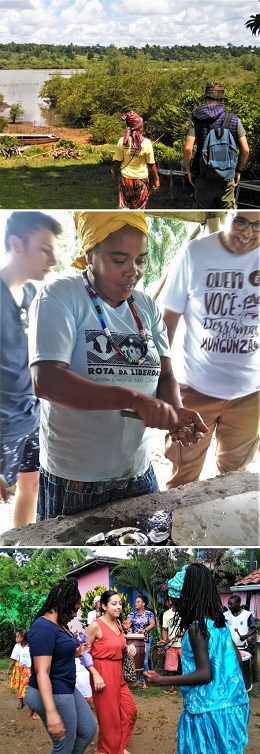 |
|
What is a journey without memorable adventures to make sure that each trip you take stays with you for a lifetime? There are countless options to choose from, making it easy to find offers that follow a sustainable path. Again, we don’t believe in an all-or-nothing approach: why not start by combining a more conventional outing, for example a classic city tour, with an excursion that supports sustainable goals? This way, our guests - especially those who are new to sustainable travel - don’t feel like they are missing out on something and still
experience the destination in an authentic way. Let’s take
Salvador de Bahia as an example. Exploring this beautiful city with its colorful colonial buildings and rich history is a fantastic experience. Afterwards, you can dive deeper into the local Afro-Brazilian traditions, for example by venturing out on the
“Freedom Route”. This excursion takes you to a Quilombo, a
settlement built by escaped slaves to resist their captors and restore the lifestyle and traditions they brought from their African homes. Participating in a government program to restore value to and help preserve Quilombola heritage, the members of the Kaonge community were trained in ethnic tourism to foster sustainable development, generate an increase in income and promote the valorization of all aspects of local culture, such as
oral storytelling, artisanal craft and food techniques or agricultural practices. You are able to listen to Kaonge’s Griô (the oldest woman in the community) share her life story and learn about the African religion Candomble. You are also shown how base ingredients for traditional cuisine, such as dendê palm oil and manioc flour, are produced. You are introduced to the community’s oyster farm which uses traditional techniques of cultivation. Did you know that oyster farming is not only a very sustainable part of aquaculture but can actually be
restorative to the water quality? Among other positive impacts, the shellfish filters the water, removes nitrogen and enhances water clarity. It also provides a habitat for young fish and crustaceans. After a presentation of the traditional Quilombola dance "samba da roda", you learn about the best ways to cook oysters while a delicious moqueca (seafood stew) is prepared for lunch. Your visit ends with an exhibition of locally created crafts and other products, which make for the best souvenirs!
If you are interested in similar excursions in our other countries, feel free to request more information here! |
 |
|
 |
 |
We are very fortunate in that
responsible accommodation choices abound in South America and
sustainable ones are on a steady rise. We prioritize locally owned businesses and if we can support a small-business owner in the process, even better! One of the new additions to our selection is
Hotel Bidasoa in Santiago de Chile. The ecological boutique hotel has been in business for more than 30 years and is still operated by the founding family. They are devoted to their
goal of becoming the most sustainable hotel in Latin America and constantly implement new measures to further their commitment to the cause. In the area of human resources and supplies, this includes respecting gender and ethnic equity, giving all members of the staff the opportunity to advance their education, and choosing a variety of local, preferably small and independent businesses for external services and products. On the environmental side, Bidasoa implemented measures to save water and energy, uses aerothermal energy in air conditioning and generates electricity from wind power
plants. Hybrid cars are used for airport transfers and guests are offered bikes to move around the city. Waste management includes a separation system, oil recycling and the donation of all glass to the Coaniquem organization for child burn victims. A minimum of 50% of the menu is plant-based and an organic garden supplies fresh produce. You can find the full list of measures here. Their 87 rooms are hypoallergenic and beautifully designed,
featuring recycled vinyl flooring. They are equipped with Tempur-Pedic mattresses, LED TV, minibar, USB connector and a private bathroom with natural, non-polluting amenities. The hotel also offers free Wi-Fi in the public areas and rooms and features an outdoor summer pool as well as a lovely garden.
Please contact us if you are looking for more recommendations for sustainable accommodation! |
|
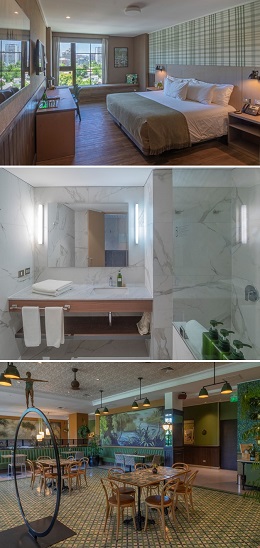 |
 |
|
 |
 |
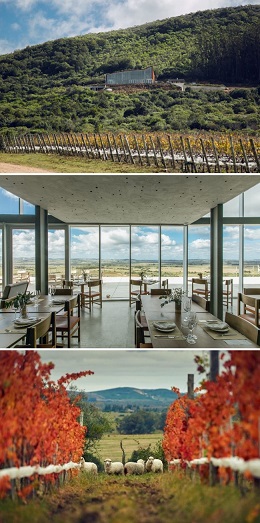 |
|
Let's talk about one of our very favorite parts of traveling:
exploring local foods and drinks! Whether you consider yourself a foodie or not, a delicious meal or a nice glass of wine always brings a smile to our faces. There is a variety of restaurants and bars that implement sustainable practices but why not go straight to the source? Uruguay is a prime spot for wine production and
sustainable vineyards, such as Viña Edén, produce some of the best varieties out there. The family-owned boutique winery is located in the rolling hills outside of Pueblo Edén and just a short drive from Punta del Este. Their goal is to
make the production process as eco-friendly as possible and they implemented a variety of measures to get there. The winery runs its entire operation on renewable solar and wind power. Rainwater is collected in artificial lakes on the property and recycled for use on the vineyard. In addition to that, the winery’s three-level building uses an energy-saving gravity flow system to move the wine between the production stages: after the grapes have been collected and processed on the first level, the wine travels down to the next level to ferment and is then stored in the third
level cellar, where the underground conditions are ideal for the ageing process.
During your visit, you can tour the vineyard, learn about Viña Edén’s sustainable approach as well as their production process, taste their excellent wines, and grab a bite in the restaurant that offers delicious dishes prepared with organic and locally sourced ingredients.
Let us know here if you would like to explore similar options in the food world in Uruguay as well as our other countries! |
 |
|
 |

|
 |
|
 |
South American Tours - Global Sales Office
South American Tours GmbH | Kaiserstr. 23 | 60311 Frankfurt am Main | Germany
Phone: +49 (0) 69 4058970 | Fax: +49 (0) 69 40589799
Mail: sales@southamericantours.com | www.southamericantours.com
South American Tours - Sales Office North America
Mail: sales-america@southamericantours.com
Copyright © South American Tours 2012-2021
Imprint
South American Tours de Uruguay Agencia de Viajes S.A. | Buenos Aires 618, Piso 2, Oficina 201 | 11000 Montevideo | Uruguay
Tel.: +59 82 91 60 050 | Fax.: +59 82 91 55 406 | E-mail: info@southamericantours.com
Managing Director: Federico Büker | Registered Office: Montevideo | Local Court: Montevideo | Commercial Register: 1194 (Ministry of Tourism) | VAT identification no.: 215224020014

|
|
Protection of data privacy and cancellation of the subscription:
This message has been sent to 10063. If you do not want to receive mails in the future you can unsubscribe by clicking
here.
|
|
|
 |
|
 |
 |
|
|